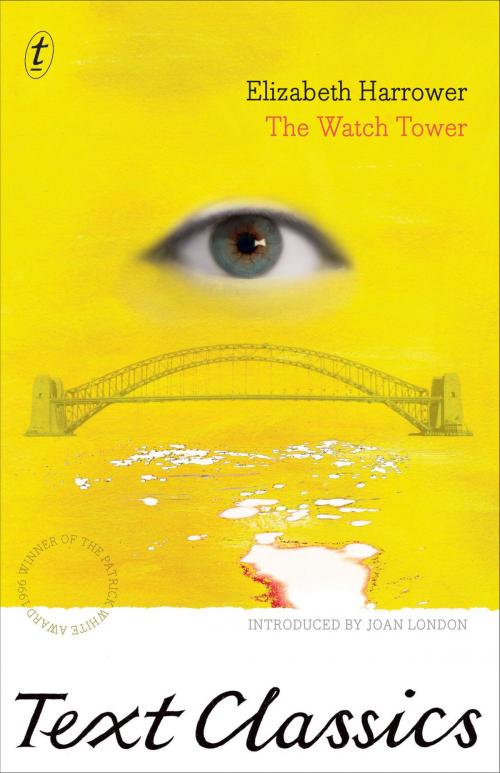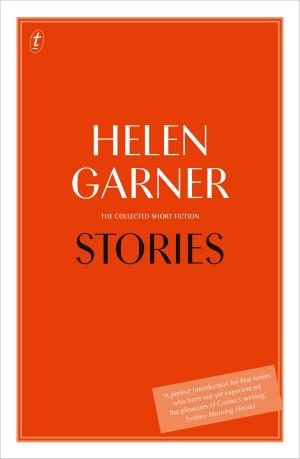| Author: | Elizabeth Harrower | ISBN: | 9781921921988 |
| Publisher: | The Text Publishing Company | Publication: | April 26, 2012 |
| Imprint: | Text Publishing | Language: | English |
| Author: | Elizabeth Harrower |
| ISBN: | 9781921921988 |
| Publisher: | The Text Publishing Company |
| Publication: | April 26, 2012 |
| Imprint: | Text Publishing |
| Language: | English |
Breaking their poses like trees snapping branches, the women urgently regarded each other, cleared away all signs of work in an instant, examined their souls for defects, in a sense crossed themselves, and waited.
After Laura and Clare are abandoned by their mother, Felix is there to help, even to marry Laura if she will have him. Little by little the two sisters grow complicit with his obsessions, his cruelty, his need to control.
Set in the leafy northern suburbs of Sydney during the 1940s, The Watch Tower is a novel of relentless and acute psychological power.
Elizabeth Harrower was born in Sydney in 1928. After leaving school she worked as a clerk and studied psychology. In 1951 Harrower moved to London. She travelled extensively and she began to write fiction. Her first novel Down in the City was published in 1957, and was followed by The Long Prospect a year later. In 1959 she returned to Sydney where she began working for the ABC and as a book reviewer for the Sydney Morning Herald. In 1960 she published The Catherine Wheel, the story of an Australian law student in London, her only novel not set in Sydney. The Watch Tower appeared in 1966. She was admired by many of her contemporaries, including Patrick White and Christina Stead, and is without doubt among the most important writers of the postwar period in Australia. Elizabeth Harrower lives in Sydney.
textclassics.com.au
'Haunting and delicate.' Kirkus Reviews
'This is a harrowing novel, relentless in its depiction of marital enslavement, spiritual self-destruction and the exploited condition of women in a masculinist society...It is a brilliant achievement.' Washington Post
'Haunting...Harrower captures brilliantly the struggle to retain a self.' Guardian
'Elizabeth Harrower's thrilling 1966 novel The Watch Tower comes rampaging back from decades of disgraceful neglect: a wartime Sydney story of two abandoned sisters and the arrival in their lives of Felix, one of literature's most ferociously realised nasty pieces of work.' Helen Garner, Australian Books of the Year
'Elizabeth Harrower's The Watch Tower truly feels like a neglected classic...I think it's one of the most moving books I've read in a very long time.' Mariella Frostrup
'I read this book twice. Once for sheer pleasure - if pleasure can be the correct term for an experience that is so distressing - and once for the purposes of this review...It left me with the strongest sense I have had for a very long time of the infinite preciousness of consciousness, at whatever cost, and of our terrifying human vulnerability.' Salley Vickers, Sydney Morning Herald
'I couldn't put down The Watch Tower, Elizabeth Harrower's dark fairytale of psychological cruelty and co-dependence set in suburban Sydney. Although published originally in 1966 (and reprinted this year by Text Classics), it still has the power to shock. Harrower's insight into the nuances of a pathological personality is forensic, and surely one of the most acute in our literature since Henry Handel Richardson's The Fortunes of Richard Mahony. At the same time, because of its complicated tone, her book retains a kind of mythic power.' Delia Falconer, Australian Books of the Year
'A superb psychological novel that will creep into your bones.' Michelle de Kretser, The Monthly
'I read The Watch Tower with a mixture of fascination and horror. It was impossible to put down. I then read all Harrower's novels: The Long Prospect (a prescient study of a relationship between a man and a clever but unrecognised young girl), Down in the City and The Catherine Wheel. Her acute psychological assessments are made from gestures, language and glances and she is brilliant on power, isolation and class.' Ramona Koval, Australian Books of the Year
'[A] fantastically incisive portrait of domestic cruelty...For all the psychological torment Harrower subjects her protagonists to, Clare's defiance brings a delectably feminist streak to The Watch Tower.' Daily Beast
'To create a monster as continually credible, comic and nauseating as Felix is a feat of a very high order. But to control that creation, as Miss Harrower does, so that Clare remains the centre of interest is an achievement even more rare. The Watch Tower is a triumph of art over virtuosity...a dense, profoundly moral novel of our time.' H.G. Kippax, Sydney Morning Herald, 19 November 1966
Breaking their poses like trees snapping branches, the women urgently regarded each other, cleared away all signs of work in an instant, examined their souls for defects, in a sense crossed themselves, and waited.
After Laura and Clare are abandoned by their mother, Felix is there to help, even to marry Laura if she will have him. Little by little the two sisters grow complicit with his obsessions, his cruelty, his need to control.
Set in the leafy northern suburbs of Sydney during the 1940s, The Watch Tower is a novel of relentless and acute psychological power.
Elizabeth Harrower was born in Sydney in 1928. After leaving school she worked as a clerk and studied psychology. In 1951 Harrower moved to London. She travelled extensively and she began to write fiction. Her first novel Down in the City was published in 1957, and was followed by The Long Prospect a year later. In 1959 she returned to Sydney where she began working for the ABC and as a book reviewer for the Sydney Morning Herald. In 1960 she published The Catherine Wheel, the story of an Australian law student in London, her only novel not set in Sydney. The Watch Tower appeared in 1966. She was admired by many of her contemporaries, including Patrick White and Christina Stead, and is without doubt among the most important writers of the postwar period in Australia. Elizabeth Harrower lives in Sydney.
textclassics.com.au
'Haunting and delicate.' Kirkus Reviews
'This is a harrowing novel, relentless in its depiction of marital enslavement, spiritual self-destruction and the exploited condition of women in a masculinist society...It is a brilliant achievement.' Washington Post
'Haunting...Harrower captures brilliantly the struggle to retain a self.' Guardian
'Elizabeth Harrower's thrilling 1966 novel The Watch Tower comes rampaging back from decades of disgraceful neglect: a wartime Sydney story of two abandoned sisters and the arrival in their lives of Felix, one of literature's most ferociously realised nasty pieces of work.' Helen Garner, Australian Books of the Year
'Elizabeth Harrower's The Watch Tower truly feels like a neglected classic...I think it's one of the most moving books I've read in a very long time.' Mariella Frostrup
'I read this book twice. Once for sheer pleasure - if pleasure can be the correct term for an experience that is so distressing - and once for the purposes of this review...It left me with the strongest sense I have had for a very long time of the infinite preciousness of consciousness, at whatever cost, and of our terrifying human vulnerability.' Salley Vickers, Sydney Morning Herald
'I couldn't put down The Watch Tower, Elizabeth Harrower's dark fairytale of psychological cruelty and co-dependence set in suburban Sydney. Although published originally in 1966 (and reprinted this year by Text Classics), it still has the power to shock. Harrower's insight into the nuances of a pathological personality is forensic, and surely one of the most acute in our literature since Henry Handel Richardson's The Fortunes of Richard Mahony. At the same time, because of its complicated tone, her book retains a kind of mythic power.' Delia Falconer, Australian Books of the Year
'A superb psychological novel that will creep into your bones.' Michelle de Kretser, The Monthly
'I read The Watch Tower with a mixture of fascination and horror. It was impossible to put down. I then read all Harrower's novels: The Long Prospect (a prescient study of a relationship between a man and a clever but unrecognised young girl), Down in the City and The Catherine Wheel. Her acute psychological assessments are made from gestures, language and glances and she is brilliant on power, isolation and class.' Ramona Koval, Australian Books of the Year
'[A] fantastically incisive portrait of domestic cruelty...For all the psychological torment Harrower subjects her protagonists to, Clare's defiance brings a delectably feminist streak to The Watch Tower.' Daily Beast
'To create a monster as continually credible, comic and nauseating as Felix is a feat of a very high order. But to control that creation, as Miss Harrower does, so that Clare remains the centre of interest is an achievement even more rare. The Watch Tower is a triumph of art over virtuosity...a dense, profoundly moral novel of our time.' H.G. Kippax, Sydney Morning Herald, 19 November 1966















